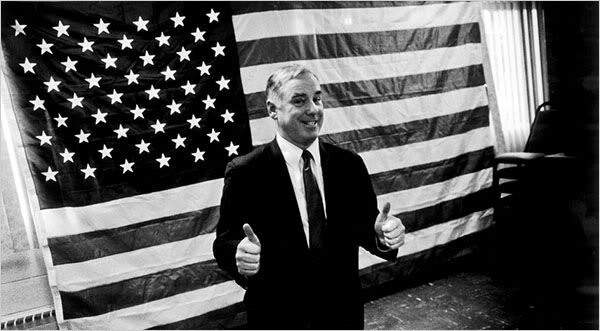Welcome to DU!
The truly grassroots left-of-center political community where regular people, not algorithms, drive the discussions and set the standards.
Join the community:
Create a free account
Support DU (and get rid of ads!):
Become a Star Member
Latest Breaking News
Editorials & Other Articles
General Discussion
The DU Lounge
All Forums
Issue Forums
Culture Forums
Alliance Forums
Region Forums
Support Forums
Help & Search
Democracy for America
Related: About this forumThe Other Winner

Paolo Pellegrin/magnumphotos.com
By MATT BAI
Published: November 7, 2008
There was a moment last summer when Howard Dean’s tenure as chairman of the Democratic Party seemed on the verge of a colossal failure. The party’s nomination process, which was supposed to have been settled by March, was devolving into a rolling civil war without end, and Democrats grumbled that Dean — who might have stepped in and sorted out the mess before it got to the con-vention floor — seemed reluctant to intervene. Of all the various party entities that raise money, only Dean’s national committee was getting clobbered by Republicans. For years, Democratic Congressional leaders had been mocking Dean’s “50-state strategy” — his plan to rebuild local parties in every state, especially in rural areas of the South and West, by hiring organizers rather than saving that money for television ads in perennial battlegrounds like Florida and Ohio. Now they whispered that his incompetence might cost them the White House.
When I spoke to him on the day after Barack Obama swept into the White House with the largest Congressional Democratic majorities since the 1970s, Dean, characteristically defiant, refused to admit to feeling vindicated. “Everyone asks me that,” he said. “Vindication is not an emotion that ever touches me, because I don’t have any doubts when I’m doing it.” But if election night stamped Obama indelibly into the pages of American history, then Dean’s place in that history, too, should probably be revisited. Very nearly discarded by his contemporaries as a spectacularly flawed presidential candidate and a bumbling chairman, Dean may well be remembered instead as the flinty figure who bridged the distance between one generation of Democrats and the next, the man who first gave voice to liberal fury and tapped transformative technologies at the dawn of the century — and then channeled all of it into rebuilding the party’s grass-roots apparatus. Just as Ronald Reagan and the conservatives learned from Barry Goldwater, just as Franklin Roosevelt and the New Dealers took inspiration from reformers like Robert La Follette, so, too, did Obama and the new progressives in America evolve from Howard Dean.
Skeptics will argue, of course, that Dean’s stewardship of the party had little to do with the Democratic rout. After all, conservative states like Virginia, Indiana and North Carolina were in play principally because Republicans had so badly mismanaged the government and because of an economic collapse that was, to be a little crass, remarkably fortunate. And in Obama, the party fielded a nominee this time who was, for all his lack of experience, vastly more compelling than his most recent predecessors on the ticket.
And yet, it was Dean, back when Obama was still serving in the Illinois State Senate, who first introduced his party to the idea that, in the Internet age, a campaign could be built from the ground up, that door-to-door organizing could matter more than TV ads. And it was Dean who argued forcefully, as chairman, that Democrats in this new era could compete in the reddest of states and build a truly national party at a time when others in the party were belittling rural voters and agitating for a complete withdrawal from the South. Now the Republicans are the ones who find themselves reduced to regional influence, their shrinking Congressional delegations confined mostly to the South and West. (Remarkably, not a single New England Republican now remains in the House.) Dean didn’t create the conditions that made that reversal possible, but he always said that if you wanted to be in a position to take advantage of favorable circumstances, then you had to at least have basic party infrastructures in place. “Chance favors the prepared mind,” Dean told me, not for the first time. “You show up, you keep working and hopefully you catch a break.”
http://www.nytimes.com/2008/11/16/magazine/16wwln-lede.html